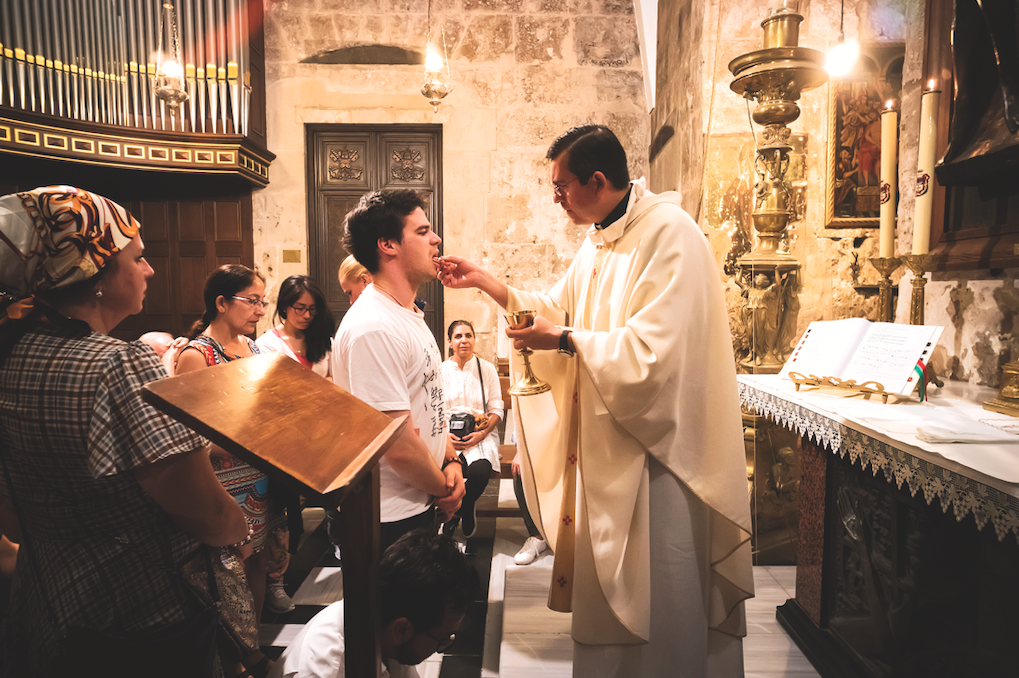In recent decades, many Christian communities have come to believe that their dwindling congregations might see some growth if they made their church services more appealing. Fearing that traditional elements of worship have become outdated, they have favoured the contemporary instead, exchanging elevated speech and solemn ritual for language, music and activities that mirror forms of popular culture. However, in abandoning tradition for the sake of accessibility, we may lose more than we realize.
In different ways, Christians have always been concerned about the accessibility of worship. The early Christians, in particular, had a theological reason for this concern. They believed that God is infinite, transcendent and unknowable — and therefore, by nature, profoundly inaccessible. How can such a God be worshipped? They found their answer in Jesus Christ.
Since worship is the offering of ourselves to God, Jesus is able to include us in his own self — offering to the Trinity, of which he is one. This is because he is both human and divine, and so he bridges the unbridgeable divide between God and us, between Creator and Creation. When we are taken up in that offering, God and the worship of God become accessible to us. In this sense, worship is not something that we do, but something that God does.
More on Broadview:
- Nora Sanders on her faith, challenges and hopes for the United Church
- I went back to church. It was joyful — and strange
- Barbecue Baptist Church delivers meals and a little levity
This was precisely what early Christians understood the eucharist to be: Christ’s self-offering in which we and all Creation are included and incorporated. That’s why the eucharist was the central act of worship in the life of the early church. And they celebrated the eucharist with ritual actions that reveal how God is at work, transforming us. In the entrance procession of the celebrant, they saw the advent of Christ and all that it brings us. In the reading of scripture, they saw the conversion of our thoughts, attitudes and actions. In the hymns, they saw our joy in the Lord. In the recitation of the Nicene Creed, our gratitude for salvation. In the sign of peace, our reconciliation. In the hymn of God’s triune holiness, our inclusion in the heavenly worship. In the Lord’s Prayer, our adoption as God’s children. And in the act of communion, our participation in God, now and in the life to come.
The more Christians learn about these ancient understandings, the more the elements of traditional worship become deeply meaningful, even indispensable, to us. We come to see them as the very things that open our awareness, not only of the divine realities that they signify and convey, but of what worship really is. We come to find in them a way of worshipping that is accessible in the truest sense.
The present time is one in which worshipping communities can no longer take anything for granted. It is an opportunity for Christians to revisit the treasures of our ancient tradition and, rather than leaving them behind, rediscover what they mean to us.
***
This column originally appeared in Broadview’s November 2020 issue with the title “Lessons from the liturgy.”
Rev. Lisa Wang is vicar to the Anglican Parish of the Transfiguration and teaches at Trinity College in Toronto.
We hope you found this Broadview article engaging.
Our team is working hard to bring you more independent, award-winning journalism. But Broadview is a nonprofit and these are tough times for magazines. Please consider supporting our work. There are a number of ways to do so:
- Subscribe to our magazine and you’ll receive intelligent, timely stories and perspectives delivered to your home 10 times a year.
- Donate to our Friends Fund.
- Give the gift of Broadview to someone special in your life and make a difference!
Thank you for being such wonderful readers.
Jocelyn Bell
Editor/Publisher















Worship is selfless and is a result of what God did for us, not what we can do for Him.
Worship is something we do, it’s an appreciation, we worship what we value.
I find it odd that Christ never worshipped, He glorified, but never worshipped.
God is the Creator, He cannot worship. “Therefore God exalted Him to the highest place and gave him the name that is above every name, that at the name of Jesus every knee should bow in heaven and on earth and under the earth, and every tongue acknowledge that Jesus Christ is Lord, to the glory of God the Father.” We are all going to worship God whether we want to or not, such a humbling thought. Perhaps we should be practicing now, so we’ll get it right later.
True worship is not a rite or a tradition, it’s a lifestyle. Our Lord’s table is: a remembrance, it’s fellowship (with God and each other), it’s Spiritual refreshment, and a declaration of the Gospel (Acts 2, 1 Corinthians 11)
Excellent piece. Thank you. All we have to do is look at Westhill United and other “cutting edge progressive” experiments that did not last even 10 years – and compare it with thousands years of Christian worship. It is such a wonderful thing we can offer to God.